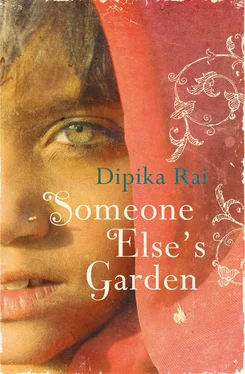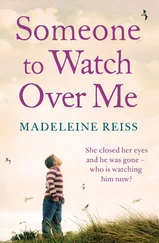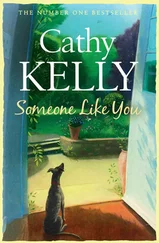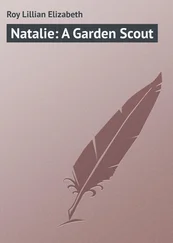‘How’sh . . . brother? Come . . . closher.’ Singh Sahib’s words are like river stones bounced by young boys across rushing water, leaping along, with great gaps in between.
Asmara Didi and Ram Singh move forward together in the single movement of a cast net. Again the turbaned man signals to the woman with a look; this time she leaves the room. Her eyes linger long and hard on Ram Singh’s back where the whitewash from the wall has left powder marks on his indigo Nehru jacket.
Ram Singh feels an old welt open up again, and he says, ‘Fine, I imagine,’ with practised nonchalance.
‘Whe . . . ll . . . you sheen him?’ Wheeze in. Wheeze out.
‘Yes.’ Monosyllabic answers convey more than full sentences. ‘. . . jealoushy . . . no . . . n,’ the old man says out of the working side of his mouth.
The son looks into his father’s face without a trace of emotion. His father is forbidden to him. Singh Sahib’s long morning in bed has not dulled the glow of his pristine crackly starched embroidered white muslin kurta with precisely thirty-seven deliberate creases in each sleeve. Asmara Didi takes great care of Singh Sahib’s clothes and puts the creases in herself each morning with a heavy brass iron studded with little arched windows along both sides through which she blows at the hot coals.
The sun is high outside. The light perfectly illuminates the picture of the elephant-headed Ganesha flanked by peacocks painted by Bibiji on the back wall of the room. There are bars on the window. Rectangles of sunlight dance just above Singh Sahib’s head, falling in and out of his eyes.
The old man lies prone, mentally shading his eyes. As it is, he can’t use his good hand for fear of falling over. The thought of falling over makes Singh Sahib’s mouth flicker with the hint of a smile. He can clearly recall how Bibiji had fallen over in the backseat of their jeep when he’d brought her back as his new bride. How embarrassed it had made her and how prettily she’d blushed. How that blush had reached out to him and grabbed his heart from inside his chest, never to let go.
What does he have to smile about? Ram Singh has learned to read the nuances of his father’s face but not his thoughts. The old man closes both eyes as the sunlight catches him mid-thought. He thinks of his wife a lot. That’s one thing he can still do with his crippled body.
‘Ask Asmara Didi to put in curtains,’ says Ram Singh, his voice packed with irritation, starting to pace the room, placing one diffident foot slowly in front of the other, thinking each step carefully through. He knows his father doesn’t like pacing. He has to calculate exactly when to stop, just before Singh Sahib’s irritation burbles over into a spurt of reprimand. He wants to bring up the issue of the property again, but doesn’t. He already knows the answer, from years of having this conversation, way before his father’s face got twisted. ‘Want me to die, do you? I am not dying yet, my brain is still as sharp as a new lemon. Forget about things that don’t concern you. You will get what you deserve when you deserve it.’ His father always spoke as if he was talking about Fate, but of course he was talking about his own plans for his son. Today he would want to say the same things through his paralysed mouth. Why bother? The son already knows the words.
Ram Singh has to grind his teeth together to stop himself from speaking. His father’s unsaid words make him prickly. Forget about things that don’t concern me, indeed. The property does concern me, all seven hundred hectares of it. And if Babulal is to be believed, the additional four hundred and sixty-seven hectares virtually owned by them in everything but name.
‘Lokend . . . Daku?’ Always talk of Lokend, his younger brother. What has Lokend got that he hasn’t? The sun drops. The rectangles slip with finality into the old man’s eyes. A trail of ants marches through the scene of pastoral delight and frolicking gods behind Singh Sahib’s head. Silent rebellion will get you nowhere, my friend. As long as you divide the land fairly, half and half. After all, there are no smaller halves. Or are there? In your realm anything is possible.
‘Can we talk about the lands? There are two problems.’
The father keeps his eyes closed, forbidding him the consideration of sight.
‘Well, you have left me in charge, haven’t you? Do you want me to quit? Would you like to handle the lands yourself?’ It is the continuation of the same argument they have been having since before the stroke. Ram Singh’s words have become progressively more cruel. His father doesn’t attempt to reply.
‘Then if you can’t handle the lands, let me do the work. I am the only one who has kept this place together. Why can’t you see that?’ The son speaks for both of them, aloud for himself and silently for his father. He knows his father’s mind, and there is no approval in it. You wish I was more like Lokend. But he is the least like you. Look at me. Can you not see yourself in me? There is more than a vestige of the old man in his son’s finely carved features, the straight nose and the strong moustache.
Singh Sahib has that twitch in his lip that tells his son the interview is over.
But the son won’t be brushed away this easily. Physically he has the upper hand. Trapped in his inactive body, his father can do nothing. Ram Singh squats close to the old man’s ear. ‘We have to act soon. More and more people are talking about taking loans from that Lala Ram. We have to stop that. I have a plan,’ he whispers harshly.
Lala Ram tried to hide the tin signs collecting in a growing heap in one corner of his shop, even so, they have popped up all over Gopalpur: Hypothecated to the Bank of India , written in curly-wurly yellow paint on black.
‘We are losing ground. There is talk of opening a branch here soon, right in that Saraswati Stores. Then we can forget about getting any interest payments at all.’
‘Huh,’ says the father, who isn’t at all worried about the Bank of India grabbing his share of the loan business. After all, who in Gopalpur is going to fill out a litany of papers asking impossible questions requiring complicated answers? Date of birth? Repayment terms? Security? And on and on. With him, they just have to plant their thumbprints in the lower right corner, place the paper bonding them – sometimes for life, sometimes for generations – in their rafters away from mice and, if they are lucky, termites, and forget about it for eternity.
‘You just give me the word, and I make sure Lala forgets about the banking business.’
Singh Sahib finally opens his eyes. He still has one weapon left: The Look. Ram Singh hasn’t seen that look in his father’s eyes for years now. The last time he had seen it was when he and Lokend fought and he had broken his younger brother’s jaw. His father had lashed him in full view of the servants, continuing the thrashing till the belt broke. Ram Singh still has the scars on his back. After a particularly bad day, he likes to look at them.
‘Lea . . . ve!’
‘Times are changing. You will have to do it sooner or later if you are to survive as Gopalpur’s zamindar. After all, it is my future too. I will not be the one to break with family tradition because of you. You yourself say that tradition and honour are everything . . .’
‘. . . do . . . hnt! Honour! It ish . . . n’t . . . you!’
The ruthlessness of the insult shoves Ram Singh to the wall. Defeated but not crushed he bounces back: ‘I know what you think. You think I have no honour. Do you really think you would do things differently? Say what you like, I am more like you than you know. Honour before Life.’ He shouts out his father’s motto before leaving the room.
Читать дальше












